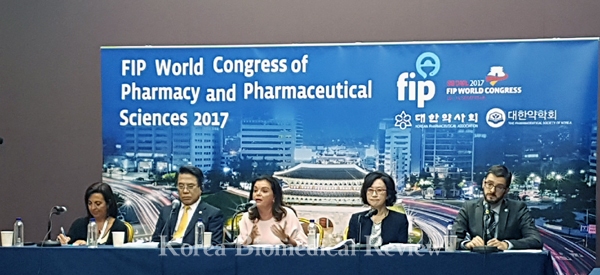International Pharmaceutical Federation (FIP) has come forward to emphasize the need to reinvigorate generic substitution, along with a caveat for a cautious approach given the different regulations in each country.
“Generic substitution is an important issue not only in Korea but also in the rest of the world,” FIP Chairman Carmen Pena told a news conference Monday. “In this general meeting, we are discussing the issues about generic substitution, including International Nonproprietary Names (INN) prescription, under the theme of ‘Beyond Pharmacy.’”
“Generic substitution can reduce costs and increase patients’ access to medicines,” he went on to say. “World Health Organization(WHO) and FIP have Good Pharmacy Practice: Joint FIP/WHO Guideline on GPP. I hope Korea will also encourage the practice to reduce cost and increase the access to medicines.”

Generic substitution is the dispensing of a chemically equivalent but less expensive drug in place of a brand-name product that has an expired patent. It usually refers to generics that have the same components with original drugs, but the prescriptions of other medicines with same components can belong to this category.
FIP has been trying to activate generic substitution since 1997 through the declaration on “Pharmacist’s authority in product selection therapeutic interchange and generic substitution.
Cho Chan-hui조찬휘, chairman of Korean Pharmaceutical Association (KPA)대한약사회, also strongly called for revitalizing generic substitution.
“France legalized the INN prescription, and the U.S. and Japan are actively encouraging doctors and patients to use generics,” he said. “In Korea, pharmacists are advised to notify doctors of their generic subscription, but the worldwide practice has yet to take root here because of resistance from the medical community.”
“The INN prescription and the generic substitution aren’t for doctors and pharmacists, but for the safety and convenience of the public and stable operation of medical insurance budget,” Cho went on to day. “We hope the government takes the lead in spreading the practice. A legal basis is necessary to improve the current system.”
The share of global generic use increased from 32.5 percent in 2005 to 56.2 percent in 2015. Japan also has strengthened its portion from 7 percent in 2004 to 60 percent in 2015 and plans to jack up the rate further 80 percent from 2018-2020.
According to the KPA, however, the portion of the generic substitution is less than 1 percent in Korea.
“INN is the information released worldwide. WHO has set an agreed name for a component acceptable for all countries. It is recommending member nations to prescribe drugs based on INN to prevent possible adverse effects on patients’ health, and is applying the same principle to biological medicines,” said Dr. Raffaella Balocco Mattavelli , the head of WHO INN expert group.
As countries have different rules, however, they need to take a cautious approach to generic substitution, FIP officials said.
“Because each country is in a different situation about generic substitution, it is necessary to take a cautious approach. FIP has helped policymakers and officials to develop policy,” Peña said.
FIP is an international organization that has 4 million pharmacists from 130 countries as its members. In the meeting, the participants unanimously agreed to revise the “Pharmacist’s authority in product selection therapeutic interchange and generic substitution” declared in 1997.

